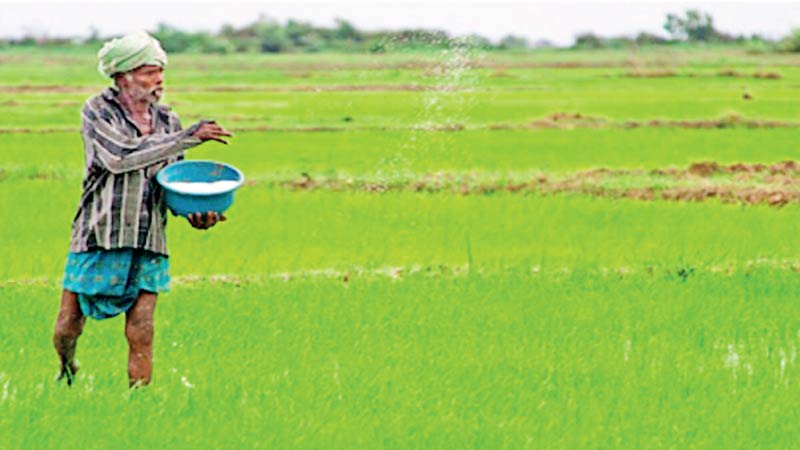Wednesday Feb 25, 2026
Wednesday Feb 25, 2026
Thursday, 31 October 2024 00:22 - - {{hitsCtrl.values.hits}}

The policy’s commitment to empowering agricultural producers is particularly strong, offering financial support and technical assistance to foster a more entrepreneurial culture among farmers
|
 The National People’s Power (NPP) Agriculture Policy presents a comprehensive and forward-thinking framework aimed at addressing the persistent and emerging challenges in Sri Lanka’s agriculture sector. By focusing on food security, modern technology, environmental sustainability, and farmer empowerment, the policy promises to enhance agricultural productivity while ensuring the sector remains resilient in the face of economic and environmental pressures.
The National People’s Power (NPP) Agriculture Policy presents a comprehensive and forward-thinking framework aimed at addressing the persistent and emerging challenges in Sri Lanka’s agriculture sector. By focusing on food security, modern technology, environmental sustainability, and farmer empowerment, the policy promises to enhance agricultural productivity while ensuring the sector remains resilient in the face of economic and environmental pressures.
Key strengths of the NPP Agriculture Policy (Pros)
Focus on national food security
The policy places a strong emphasis on food and nutrition security, underscoring the importance of State support for local food production and maintaining sufficient stocks of essential food items for at least three months. This approach can mitigate food shortages during crises, stabilising the market and keeping prices in check. The inclusion of a real-time food stock database further supports effective planning and management.
Sustainable agricultural practices
By promoting environmentally friendly operations, the policy tackles a critical need to balance agricultural productivity with sustainability. The focus on organic farming, the use of local raw materials for fertilisers, and gradual transition to “Good Agricultural Practices” (GAP) offer a path to mitigate environmental degradation while supporting long-term agricultural viability.
Technological integration
One of the key highlights is the promotion of advanced technologies such as cold chain management, real-time national agricultural databases, and micro-irrigation. These innovations can reduce post-harvest losses, conserve water, and enhance the overall efficiency of agricultural production. By encouraging farmers to adopt such technologies, the policy paves the way for more streamlined and data-driven agricultural systems.
Farmer empowerment and entrepreneurship
The policy’s commitment to empowering agricultural producers is particularly strong, offering financial support and technical assistance to foster a more entrepreneurial culture among farmers. By promoting farmer-administered cooperatives, facilitating intercropping, and establishing export villages, it lays the groundwork for boosting farmer incomes while promoting local and international market engagement.
Climate-resilient agriculture
Developing climate-resilient crop varieties and promoting farming techniques that can withstand climate variability is another commendable aspect. Given the growing threat of climate change, these measures ensure that farmers are better equipped to manage risks, thereby safeguarding the sector’s productivity.
Support for value addition
The policy emphasises the importance of value addition through the establishment of agro-industrial zones and encouraging branded exports. This focus on processing and value addition is crucial for moving Sri Lanka up the agricultural value chain, enhancing export potential, and making Sri Lankan products more competitive globally.
Promoting agricultural entrepreneurship
By setting a goal to create 50,000 (i.e., approximately 3% of the total farmers involved in agriculture in Sri Lanka) agricultural entrepreneurs over five years, the policy highlights the importance of entrepreneurship in revitalising the sector. This initiative will not only generate rural employment but also contribute to the growth of agri-businesses and exports, ultimately boosting foreign exchange earnings.
Key considerations and recommendations (Cons)
Implementation challenges
The policy sets ambitious targets, such as transforming small-scale farms into medium and large-scale operations. While this is a commendable vision, it may be challenging in practice due to historical resistance to land consolidation. A feasible approach could involve introducing pilot projects in select regions to demonstrate the benefits and build trust. Additionally, providing ongoing education and training will be essential to ensure that farmers are adequately prepared for these changes.
Enhancing Public-Private Partnerships (PPPs)
While the policy relies on PPPs for initiatives like cold storage, processing, and transportation, there is a need to ensure that these partnerships are structured effectively. To avoid potential inefficiencies, a robust regulatory framework that ensures transparency, fair competition, and accountability is crucial. Performance-based incentives for private partners and independent monitoring bodies can help ensure the success of these ventures.
Making technology accessible
While the adoption of modern technologies is necessary to improve agricultural efficiency, the associated costs may be prohibitive for small and medium-sized farmers. To make technology more accessible, the Government could explore targeted subsidy programs or low-interest loans for technology adoption. Additionally, promoting cooperative models where farmers can share resources like machinery and cold storage facilities could reduce individual financial burdens.
Youth engagement in agriculture
Although the policy touches on the importance of increasing youth participation, further measures could be developed to make agriculture more attractive to younger generations. For instance, integrating digital agriculture platforms, such as mobile apps for farming solutions, could appeal to tech-savvy youth. Setting up start-up incubators, offering seed funding, and creating mentorship programs would also encourage young entrepreneurs to enter the sector.
Addressing price volatility
Ensuring fair prices for farmers and consumers is a key objective of the policy. However, relying solely on market regulation may create unforeseen distortions. A more balanced approach could involve introducing market stabilisation funds or crop insurance schemes to shield farmers from price fluctuations. Establishing commodity boards or cooperatives that allow farmers to negotiate better prices could also offer a more sustainable solution to managing price volatility.
Overall impact on the agriculture sector
Boosting agricultural efficiency
The policy’s focus on modernising agricultural systems, increasing mechanisation, and improving water management is likely to enhance productivity across the sector. By aiming to increase national tea production, improve paddy yields, and support high-value crops like coconut and rubber, the policy sets ambitious but achievable goals for revitalising Sri Lanka’s agricultural output.
Reducing import dependency
The policy’s emphasis on substituting imports with locally produced food items, as well as expanding production in key export sectors, will significantly reduce the country’s dependence on imports. This approach will not only improve food security but also conserve foreign exchange reserves, which are critical for the country’s economic stability.
Encouraging value-added exports
The focus on value addition through processing and branding will enable Sri Lankan agricultural products to gain greater traction in international markets. Establishing export villages and promoting Ceylon Tea as a premium brand are just a few examples of how the policy aims to uplift the export potential of the sector.
Improving farmer livelihoods
Through farmer empowerment initiatives, such as cooperatives, financial aid for micro-irrigation, and a comprehensive pension scheme, the policy can significantly improve the socio-economic conditions of farmers. These measures, combined with climate resilience strategies, will help reduce farmers’ vulnerability to both economic and environmental shocks.
Sustainable agriculture for long-term growth
By promoting organic farming, chemical-free inputs, and sustainable land management, the policy addresses environmental sustainability. The introduction of climate-resilient crops and good agricultural practices will help secure long-term agricultural productivity, making Sri Lanka’s agriculture sector more resilient to future challenges.
Conclusion
The NPP agriculture policy offers a solid foundation for revitalising Sri Lanka’s agriculture sector. With its focus on sustainability, technology adoption, and farmer empowerment, it has the potential to transform the sector into a more productive, efficient, and globally competitive industry. However, the success of the policy will depend on thoughtful implementation, accessibility of technology, fostering youth participation, and effectively managing public-private partnerships. By addressing these areas, the policy could significantly uplift the agriculture sector, ensuring long-term resilience and prosperity for Sri Lanka’s farmers.
Moreover, the NPP agriculture policy is not an isolated effort. When reviewed alongside policies in other sectors, it creates substantial synergy. For instance, the Industry Development Policy addresses concerns over capital, labour, SMEs, and markets, helping to lower production costs. The Technology and R&D Policy supports the innovation drive, while the Education Policy enhances skills and capacity building needed in the agriculture sector.
Additionally, the Tourism Industry Policy aligns with agriculture by boosting demand for high-quality local food. The Digital Strategy further complements this by ensuring affordable and accessible technology, placing critical information in the hands of farmers and agribusiness stakeholders. Altogether, this interconnected policy framework promises to holistically support the agriculture sector’s growth and modernisation.
(The writer is a pioneering leader in agriculture and technology, renowned for making innovative, affordable agrisolutions accessible to farming communities. As co-founder and Secretary of the Sri Lanka Agripreneurs’ Forum (SLAF) and Assistant Secretary General at The Ceylon Chamber of Commerce, his work continues to transform Sri Lanka’s agricultural landscape.)